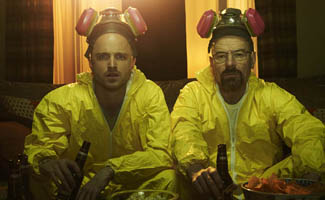[Warning: This post contains spoilers]

Image credit: Amctv.com
In my last post I defined “Breaking Bad” as a tragicomedy. Though the series was suspenseful, it maintained its comedic touch through visual elements. Successful tragicomedies are ones which constantly maintain their equilibrium: neither becoming too humorous, nor too dramatic. Because of this balance, there is something to the tragicomic work that gives it a certain fullness, a sense of having lived a complete life. To this end, there are a few visual scenes from “Breaking Bad” which I would suggest are representative anecdotes; images which serve as microcosmic summations for the series at large.
The first is the longest running visual gag of the show: the home on the range. Time and again, Walt and Jesse are paired as a couple – two men making their home in a Winnebago meth lab. In the show, both run through the usual clichés of domestic couples on television: Walt yells at Jesse not to smoke in the trailer, Jesse mocks Walt for his eccentric attention to detail. In the midst of the humor of the scene, though, there is real pathos. The intensity of Walt’s love for Jesse is balanced by the wry humor provided by the setting. Take, for example, the domestic space of the couch in the photo above. They could be romantic partners, or a family. Still, a dramatic tenderness is just as important as comedy. The fumigation materials and the meth equipment, coupled with that knowing look, solidify them as inhabiting the trope of the untamed outlaw.
The other main tragicomic visual juxtaposition is one I hinted at in my first post: anything which shows the scope of the human and emphasizes its frailty. The classic question of who is at the helm, and whether this vast universe is calculated or uncalculated is at the center of “Breaking Bad.” Nussbaum, like many critics, said “Felina” was too coincidental and unrealistic, but nearly every episode of “Breaking Bad” relied heavily upon butterfly-effect-style tragedy or cosmic-luck comedy. Consider the tragic scene where Walt lets Jane O.D. Later, mirroring this act, her own father “stands by” and passively murders hundreds by allowing two planes to crash into each other. And the representative image of that? An absurdly small and fragile sign of life -- a hauntingly pink teddy bear. The question of human agency and cosmic order emerges again in the episodes which center on the fly. With intense Chaplin-esque physical humor Walt tries again and again to kill the fly -- all to keep Gustavo Fring’s meth lab (and his batch of meth) immaculate. It is, perhaps at this time, in coming to peace with the fly, that the tides turn towards a view of submission to a cosmic order for Walt: as here is where Walt Whitman, “Breaking Bad”’s poet laureate makes his appearance. As if we needed any more signs of the show’s tragicomic propensities: Whitman is nothing if not tragicomic. Ever fixated on death with simultaneous levity: he’s the poet of body odor and the stars.
The simultaneous shock of tragedy, mingled with the absurd, puts a halo around the tragicomic event. As Nussbaum notes, “So many moments felt peculiarly underlined: we see the ricin stirred into Lydia’s tea in a dream-like closeup.” In John Dewey’s Art as Experience, he explains that there are everyday dull experiences, and then there is having an experience – these are the events which stand out in one's memory in stark relief. A truly significant experience, an experience proper, is one which “is so rounded out that its consummation is not a cessation. Such an experience is a whole and carries with it its own individualizing quality and self-sufficiency. It is an experience.” Walt Whitman might have said something similar, and maybe the writers of "Breaking Bad" as well – because writers of the tragicomic strive towards representation of a more total experience, one which is rounded out because it is balanced. Life is full of false starts, pauses, lulls – and life may not be forever depending on your views, but the moments in life most like art are, curiously, the ones which make us feel most completed. They’re the representative anecdotes, memories which speak to the nature of our lives at large. This, I would finally suggest, is why the tragicomedy is the genre that is always in some way about finales, because tragecomedies are forever gesturing towards endings, and yet, because of their fullness, there is no cessation of the total experience which they represent. R.I.P. “Breaking Bad”, 2008-2013.
Recent comments
2 years 29 weeks ago
2 years 44 weeks ago
2 years 44 weeks ago
2 years 50 weeks ago
3 years 4 weeks ago
3 years 4 weeks ago
3 years 4 weeks ago
3 years 6 weeks ago
3 years 6 weeks ago
3 years 6 weeks ago